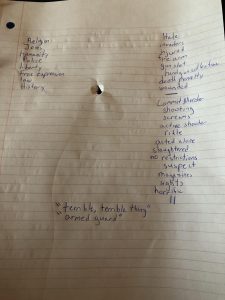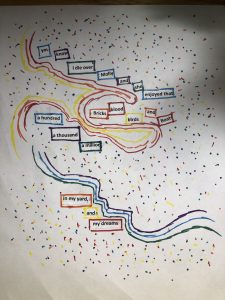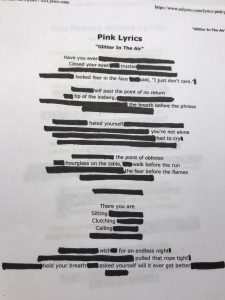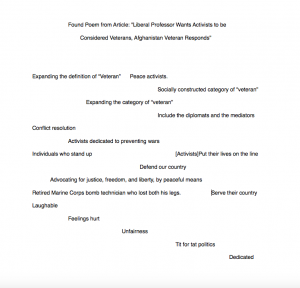I chose to do my found poem on an article regarding the events that transpired at the Tree of Life Synagogue in Pittsburgh. A horrific day in history that seems to happen far too often nowadays. It seems as if a tragedy like this event happens every other day and we’ve become so numb to these horrific murders.
My poem highlights the different aspects, both supposedly good and bad, that contributed to the killing. Starting with religion, the poem begins the same as any major historical event begins. One of my favorite quotes regarding religion comes from comedian Jon Stewart, “Religion. Its given people hope in a world torn apart by religion.” In world run by hate, the only justification that people have is faith. The opposing word from religion is in fact Hate. I wanted there to be a divide in designing my paper to show the many divisions of this country. Within the poem it divides “good” terms and “bad” terms, however as a whole it represents the division within our political parties, religions, race, sexuality, genders, etc. The words underneath Religion and Hate then tell the rest of the story that is American society. The term “Jews” represents more than those who follow Judaism, but any minority group as well. Minority groups are being labeled as “invaders”, humanity is injured, Police aren’t keeping us safe from firearms, Liberty comes with a gunshot/bullet, free expression to people means having a handgun collection, law is relying on killing in order to punish those who kill, and history of the United States is forever wounded by these horrible acts of violence. The hate list then continues on much longer due to the representation of hate being the controlling factor of modern day society and it’s future. In the bottom middle of my poem it shows 2 quotes for our President, of course not offering condolences, but instead stating it was a “terrible, terrible thing” and that an armed guard would have stopped the gunman. I don’t know why he believes this considering if you add gasoline to a fire you get more fire. I conclude my poem with the number “11” representing the 11 humans who lost their lives in the Tree of Life massacre. Take note that I said humans and not people, our government doesn’t view us as people. Their bullets have proven that to us.




